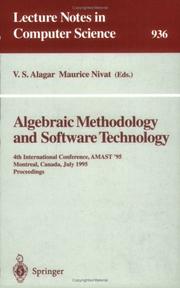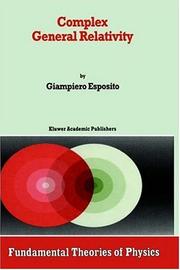| Listing 1 - 4 of 4 |
Sort by
|
Periodical
ISSN: 1300686X 22978747 Year: 1995 Publisher: [S.l.] Association for Scientific Research
Abstract | Keywords | Export | Availability | Bookmark
 Loading...
Loading...Choose an application
- Reference Manager
- EndNote
- RefWorks (Direct export to RefWorks)
Mathematics --- Mathematics. --- Mathematical Theory --- Math --- Science --- interdisciplinary applications of mathematics and computation --- data mining --- applied mathematics --- mathematical modelling --- numerical analysis --- Mathematical statistics --- Computer. Automation

ISBN: 3540594086 0387594086 3540492453 9780387594088 9783540594086 Year: 1995 Volume: 920 Publisher: Berlin : Springer-Verlag,
Abstract | Keywords | Export | Availability | Bookmark
 Loading...
Loading...Choose an application
- Reference Manager
- EndNote
- RefWorks (Direct export to RefWorks)
This volume constitutes the proceedings of the Fourth International Conference on Integer Programming and Combinatorial Optimization, IPCO '95, held in Copenhagen in May 1995 under the sponsorship of the Mathematical Programming Society. Integer programming and combinatorial optimization provide a fruitful theoretical and algorithmic basis for the solution of a number of optimization problems occuring in real-world situations, such as production planning and scheduling, routing, crew scheduling, or network construction. This volume presents 36 revised papers selected from a total of 105 submissions and offers a representative up-to-date snapshot on the state of the art in this interdisciplinary area of research and applications.
Integer programming --- Combinatorial optimization --- Programmation en nombres entiers --- Optimisation combinatoire --- Congresses. --- Congrès --- Congresses --- Congrès --- Information theory. --- Distribution (Probability theory. --- Mathematics. --- Computer software. --- Numerical analysis. --- Combinatorics. --- Theory of Computation. --- Probability Theory and Stochastic Processes. --- Applications of Mathematics. --- Algorithm Analysis and Problem Complexity. --- Numerical Analysis. --- Combinatorics --- Algebra --- Mathematical analysis --- Software, Computer --- Computer systems --- Math --- Science --- Distribution functions --- Frequency distribution --- Characteristic functions --- Probabilities --- Communication theory --- Communication --- Cybernetics --- Integer programming - Congresses --- Combinatorial optimization - Congresses

ISBN: 3540600434 3540494103 9783540600435 Year: 1995 Volume: 936 Publisher: Berlin : Springer-Verlag,
Abstract | Keywords | Export | Availability | Bookmark
 Loading...
Loading...Choose an application
- Reference Manager
- EndNote
- RefWorks (Direct export to RefWorks)
This volume constitutes the proceedings of the 4th International Conference on Algebraic Methodology and Software Technology, held in Montreal, Canada in July 1995. It includes full papers or extended abstracts of the invited talks, refereed selected contributions, and research prototype tools. The invited speakers are David Gries, Jeanette Wing, Dan Craigen, Ted Ralston, Ewa Orlowska, Krzysztof Apt, Joseph Goguen, and Rohit Parikh. The 29 refereed papers presented were selected from some 100 submissions; they are organized in sections on algebraic and logical foundations, concurrent and reactive systems, software technology, logic programming and databases.
Software engineering --- Abstract data types (Computer science) --- Congresses. --- Congresses --- Information theory. --- Software engineering. --- Mathematics. --- Logic design. --- Computer science. --- Theory of Computation. --- Software Engineering/Programming and Operating Systems. --- Applications of Mathematics. --- Logics and Meanings of Programs. --- Mathematical Logic and Formal Languages. --- Software Engineering. --- Math --- Science --- Informatics --- Design, Logic --- Design of logic systems --- Digital electronics --- Electronic circuit design --- Logic circuits --- Machine theory --- Switching theory --- Computer software engineering --- Engineering --- Communication theory --- Communication --- Cybernetics --- Software engineering - Congresses. --- Abstract data types (Computer science) - Congresses

ISBN: 0792333403 9786610537143 1280537140 0306471183 Year: 1995 Volume: 69 Publisher: Dordrecht ; Boston : Kluwer Academic Publishers,
Abstract | Keywords | Export | Availability | Bookmark
 Loading...
Loading...Choose an application
- Reference Manager
- EndNote
- RefWorks (Direct export to RefWorks)
This book is written for theoretical and mathematical physicists and mat- maticians interested in recent developments in complex general relativity and their application to classical and quantum gravity. Calculations are presented by paying attention to those details normally omitted in research papers, for pedagogical r- sons. Familiarity with fibre-bundle theory is certainly helpful, but in many cases I only rely on two-spinor calculus and conformally invariant concepts in gravitational physics. The key concepts the book is devoted to are complex manifolds, spinor techniques, conformal gravity, ?-planes, ?-surfaces, Penrose transform, complex 3 1 – – space-time models with non-vanishing torsion, spin- fields and spin- potentials. 2 2 Problems have been inserted at the end, to help the reader to check his und- standing of these topics. Thus, I can find at least four reasons for writing yet another book on spinor and twistor methods in general relativity: (i) to write a textbook useful to - ginning graduate students and research workers, where two-component spinor c- culus is the unifying mathematical language.
General relativity (Physics) --- Quantum gravity --- Supersymmetry --- Relativité générale (Physique) --- Gravité quantique --- Supersymétrie --- EPUB-LIV-FT SPRINGER-B --- Physics. --- Algebraic geometry. --- Partial differential equations. --- Applied mathematics. --- Engineering mathematics. --- Differential geometry. --- Gravitation. --- Classical and Quantum Gravitation, Relativity Theory. --- Theoretical, Mathematical and Computational Physics. --- Differential Geometry. --- Partial Differential Equations. --- Algebraic Geometry. --- Applications of Mathematics. --- Quantum gravity. --- Supersymmetry. --- Global differential geometry. --- Differential equations, partial. --- Geometry, algebraic. --- Mathematics. --- Math --- Science --- Algebraic geometry --- Geometry --- Partial differential equations --- Geometry, Differential --- Mathematical physics. --- Engineering --- Engineering analysis --- Mathematical analysis --- Differential geometry --- Physical mathematics --- Physics --- Field theory (Physics) --- Matter --- Antigravity --- Centrifugal force --- Relativity (Physics) --- Mathematics --- Properties --- Unified theories --- Particles (Nuclear physics) --- Symmetry (Physics) --- Gravity, Quantum --- Gravitation --- Quantum theory --- Relativistic theory of gravitation --- Relativity theory, General
| Listing 1 - 4 of 4 |
Sort by
|

 Search
Search Feedback
Feedback About UniCat
About UniCat  Help
Help News
News